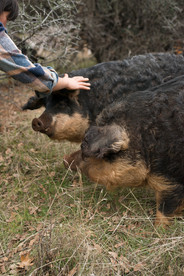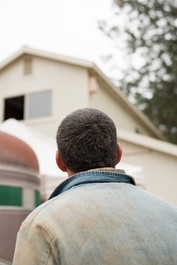
MOLLY NAKAHARA
Dinner Bell Farm
Chicago Park, CA
I’m excited to invite you to my conversation with Molly Nakahara. Molly is a farmer and the farm institute director at the nonprofit Sierra Harvest. She has also worked to support farmers through the UC Cooperative Extension and as a member of the EcoFarm Board of Directors. Molly grew up in the San Francisco Bay Area but moved with her partner to Grass Valley in 2010. There they built Dinner Bell Farm, which offers certified organic flowers and pasture-raised pork.
Molly’s paternal grandparents and great grandparents farmed lettuce and green onions in Salinas, California before their land was confiscated and they were imprisoned at a Japanese internment camp during WWII. After the war, her family continued to grow for themselves on a small city allotment and this nurtured her passion for growing food and flowers.
For Molly, farming has been a radical act of connecting with her ancestors and continuing her family’s farming legacy that was previously cut short by racism and xenophobia.

Like many growers, when Molly first forayed into farming, she committed to only growing "pragmatic" crops, meaning food. She believed flowers to be impractical, and chose not to plant them at first. However, as time went on, she opened up to the magic and possibility that flowers provide.
Molly learned that her grandmother was an immensely talented ikebana artist. Ikebana is the ancient Japanese art of arranging flowers, or in translation, "making flowers alive." She began her own practice of creating art and beauty through arranging flowers and coming to an organic love and appreciation of them.
Like many new farmers, Molly also tried to do everything all at once, before cutting back and deciding to specialize. The act of limiting her products to what she has named #baconandblooms has allowed the family farm to be a lot more manageable. As she mentions in our interview, having a small farm and an off-farm job has allowed her and her husband to take breaks some years, knowing they will always be able to come back to the farm. While farming isn't necessarily the most lucrative profession, Molly loves the work, and loves feeling so connected and intertwined with the seasons and the land.
Early into her flower farming journey, Molly's husband had the idea that they donate extra flowers to the local hospice center. She found the experience of bringing joy to people in their final days to be immensely moving. She grew the practice even more, and has allowed customers to help pitch in so that she may be able to give back even more to the hospice community.
Growing flowers has also allowed Molly to appreciate their value in new ways. Paraphrasing her sentiments, flowers are how we express emotion. They are a part of the most important events in our lives. People buy flowers for weddings, births, funerals, and other special occasions. They are how we share our love, and express affection to one another. Knowing that her ancestors also grew and had a passion for florals is what has also allowed Molly's passions grow. Through her work, she now feels like she is helping to connect with and heal her ancestral line.
In our conversation we speak about the difficulties small scale farmers face when it comes to land access and climate uncertainty, reconnecting with ancestral legacy, the tremendous power of small radical acts of kindness, raising children on a farm, the value of specializing, and so much more.

This is a story about healing through the soil, being a good neighbor, the emotional value of philanthropy, and embracing beauty for its own sake.

LINKS






























































































Kaiser OTC benefits provide members with discounts on over-the-counter medications, vitamins, and health essentials, promoting better health management and cost-effective wellness solutions.
Obituaries near me help you find recent death notices, providing information about funeral services, memorials, and tributes for loved ones in your area.
is traveluro legit? Many users have had mixed experiences with the platform, so it's important to read reviews and verify deals before booking.